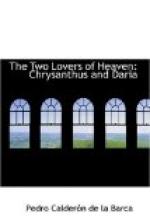“If Calderon can ever be made popular here, it must be in the manner generally adopted by Mr. Mac-Carthy in the specimens, six in number, which are here translated, preserving, namely, the metrical form, which is one of the characteristics of the old Spanish drama. This medium, through which it partakes of the lyrical character, is no accident of style, but an essential property of that remarkable creation of a poetic age—remarkable, because while the drama so adorned was entirely the offspring of popular impulse, in opposition to many rigorous attempts in favour of classical methods, it was at the same time raised above the tone of common expression by the rhythmical mode which it assumed, in a manner decisive of its ideal tendency. It thus displays a combination rare in this kind of poetry: the spirit of an untutored will, embodied in a form the romantic expression of which might seem only congenial to choice and delicate fancies. . . . .
“In conclusion, what has now been said of Calderon, and of the stage which he adorned, as well as of the praise justly due to parts of Mr. Mac-Carthy’s version, will at least serve to commend these volumes to curious lovers of poetry”.
From an elaborate article in “The Athenaeum”, by the late eminent Spanish scholar, Mr. J. R. Chorley, on the first two volumes of Mr. Mac-Carthy’s translations from Calderon.
THE CONSTANT PRINCE.
A Drama.
“In his dramas of a serious and devout character, in virtue of their dignified pathos, tragic sublimity, and religious fervour, Calderon’s best title to praise will be found. In such, above all in his Autos, he reached a height beyond any of his predecessors, whose productions, on religious themes especially, striking as many of them are, with situations and motives of the deepest effect, are not sustained at the same impressive elevation, nor disposed with that consummate judgment which leaves nothing imperfect or superfluous in the dramas of Calderon. ‘The Constant Prince’ and ‘The Physician of his own Honour’, which Mr. Mac-Carthy has translated, are noble instances representing two extremes of a large class of dramas”.
From the same article in “The Athenaeum”, by J. R. Chorley.
THE PHYSICIAN OF HIS OWN HONOUR.
“‘The Physician of his own Honour’ is a domestic tragedy, and must be one of the most fearful to witness ever brought upon the stage. The highest excess of dramatic powers, terror and gloom has certainly been reached in this drama”.
From an eloquent article in “The Dublin University Magazine” on “D. F. Mac-Carthy’s Calderon”.
THE SECRET IN WORDS.
A Drama.
“The ingenious verbal artifice of ‘The Secret in Words’, although a mere trifle if compared to the marvellous intricacy of a similar cipher in Tirso’s ‘Amar por Arte Mayor’, from which Calderon’s play was taken—loses sadly in a translation; yet the piece, even with this disadvantage, cannot fail to please”.




